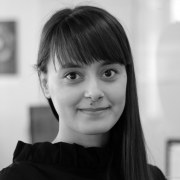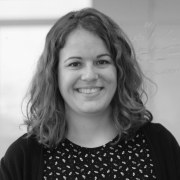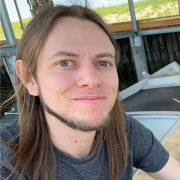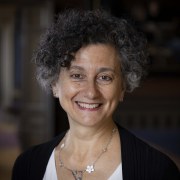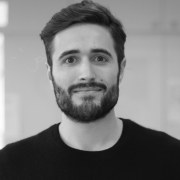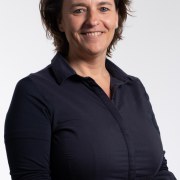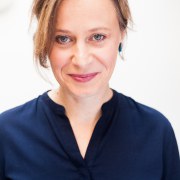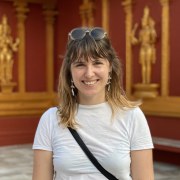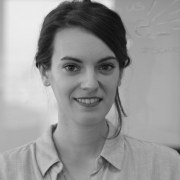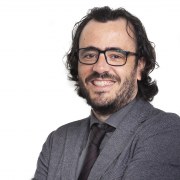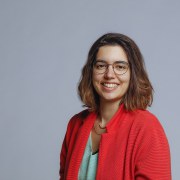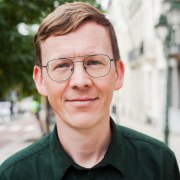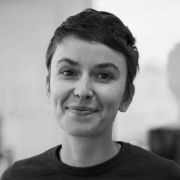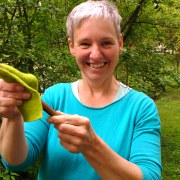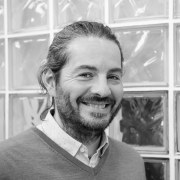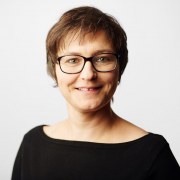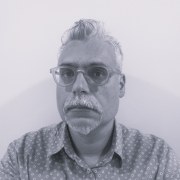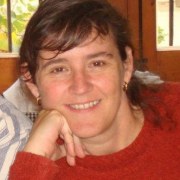The courageous speakers of this session will be telling you about their projects in an original and jargon-free style.
Expect a two-minute story for each project, followed by 45 minutes of networking. Join to get a quick overview of ongoing non-profit science engagement actions and meet those behind the showcased collaborative initiatives. This session will be streamed online.
The call for participants for this session will open mid-February!
Facilitator
Session speakers
Public Engagement Manager
Cyber Valley
Tübingen
Germany
Artificial intelligence (AI) poses social, cultural, and ethical challenges. How do these learning systems work and how will they alter public discourses and society? While research in the field is advancing rapidly, the prospect of AI-based technologies has not only been met with enthusiasm: current debate and media coverage has also revealed scepticism, fear and information deficits. At the same time, European policymakers are discussing approaches to regulating AI research and applications. A major challenge for communication research and public engagement which The Tübingen Center for Rhetorical Science Communication Research on Artificial Intelligence (RHET AI) is facing.
Researcher (Assistant Professor)
Fondazione Istituto Italiano di Tecnologia
Genoa
Italy
MEMEX Project promotes social cohesion through collaborative, heritage-related tools - methodology and app - that provide inclusive access to tangible and intangible cultural heritage and, at the same time, facilitate encounters and interactions between communities at risk of social/cultural exclusion. The targets of MEMEX are professionals from socio-cultural organisations who work with socially fragile people that are systematically blocked from various cultural opportunities. MEMEX deploys three distinct pilots to analyse different expectations from communities located in different regions of Europe, with inhabitants of priority neighbourhoods (Paris, France), first and second-generation migrant communities (Lisbon, Portugal) and migrant women in the city (Barcelona, Spain).
Program Director
International Science Programme (ISP), Uppsala University
Uppsala
Sweden
The International Science Programme (ISP) works with education and research capability building in low-income countries. On the occasion of the International Year of Basic Sciences for Sustainable Developments 2020 (IYBSSD2022), ISP is planning activities to stimulate the curiosity of young people, and especially girls, about science in Uganda and in Tanzania. Interactive scientific installations will give the children the opportunity to learn science in a more conceptual way, fundamental in these countries where there are no demonstration kits and labs in the schools. We want to connect with Ecsite members who can contribute materials for hands-on experiments to attract young people to science in Uganda and Tanzania by joyfully explaining scientific phenomena.
Project Manager
Ecsite
New and emerging technologies bring with them new ethical challenges and societal consequences. The EU-funded project TechEthos aims to ensure that the highest ethical standards are adopted at the EU and international levels by providing researchers and policy makers with the adequate guidance and tools. In this endeavour, Ecsite and several of its members will play a crucial role in understanding and further developing societal perspectives on Climate Engineering, Extended Digital Reality, and Neuro-technologies through a programme of public engagement events, in-depth dialogues, exhibitions and analyses.
program manager Public Engagement
Utrecht University
Utrecht
Netherlands
In October 2021, Utrecht University and Utrecht Public Library succeeded in reaching audiences who were ‘not the usual suspects’ with the activity ‘A word about tomorrow’ by using an accessible approach and well-trained researchers. In an innovative setup at seven neighbourhood libraries, visitors discovered what science is, and that science is about questions and being curious. They were invited to talk with a researcher about issues that matter to them: ‘What are their hopes, dreams and concerns for the future?’ and ‘What questions can help researchers to reach this ideal scenario?’. Over 500 visitors of various ages and backgrounds shared their thoughts and questions with researchers; these will be included in the Utrecht Science Agenda. We are currently working on a follow-up to this successful activity.
CEO
Stickydot
Brussels
Belgium
We live in a world where it is now more important than ever to find concrete solutions to pressing health and environmental challenges. Every day, science and innovation is rising up to these global challenges, yet it is still not enough to solve the problems that we face. Europe is on a mission to deliver 100 climate-neutral cities by 2030 and the only way to find workable solutions to achieve climate-neutrality is through the active participation of all concerned. The H2020 project MOSAIC is developing an Open Innovation methodology designed to involve quadruple-helix actors, including and especially citizens, in mission-oriented challenges. The uniqueness of the project is that this methodology will be tested on the ground in cities. Co-creation pilots will offer bespoke mechanisms and tools to engage citizens and all stakeholders in a city’s innovation ecosystem needed to reach the goal of climate-neutrality.
Museum Curator
Perth
Australia
We are currently developing an online exhibition "Life: Through the Looking Glass,” that will be launched at the end of April. It will showcase the highly abstract work of the scientists in the EvoCELL network. With it, we are reimagining science exhibitions from ‘finished science’ to ‘works-in-progress’, and demonstrating how well the online realm lends itself to exhibit the processual nature of science.
Project Manager
Ecsite
Brussels
Belgium
The H2020 project DOORS - Digital Incubator for Museums comes to support museums at a moment in which attitudes towards the digitalisation of the sector are changing. DOORS seeks to give small and medium-sized museums across Europe an opportunity to steer the direction of the sector’s digital transformation. The challenges of digitalisation are disproportionately found within small museums where the technologies and expertise to launch and sustain digital strategies are usually unattainable. The project wants to reduce the digitalisation gap by creating the space for small institutions to voice their needs and offering them access to knowledge, resources, expertise and an incubation and skill-building programme.
Head of Marketing and Communication
Catalan Institute of Nanoscience and Nanotechnology (ICN2)
Barcelona
Spain
BrainCom's Virtual Reality App is an experience to communicate the BrainCom European research project. It is available for Apple and Android mobile devices. The project presents the science behind BrainCom, which aims to develop a new generation of graphene-based neuroprosthetic devices for large-scale recording and stimulation of the human cortex. This technology is suitable for exploring and repairing high-level cognitive functions. The immersive journey consists of three parts: An introduction to the scientific challenge and the envisioned solution, visiting research spaces to meet the people behind it and stimulating critical thinking about the potential applications of this technology.
Co-Founder, Co-Director & Postdoctoral Fellow
CIDTFF - Research Centre on Didactics and Technology in the Education of Trainers, Department of Psychology and Education, University of Aveiro; Cartas com Ciência
Lab in a Suitcase is a low-cost, portable and easy-to-maintain open science experimental kit that allows one to carry out educational and scientific research activities in a more independent manner. By enabling researchers and professors to access low-cost, serviceable equipment, scientists and students have access to opportunities that could otherwise be hindered by a lack of local infrastructure and logistics networks. Collaborations were established with nine scientists from five African Portuguese-speaking countries. One of them performed the first PCR in the history of the University of São Tomé by using ‘Lab in a Suitcase’ in a molecular biology practical.
Co-founder
Stickydot
Brussels
Belgium
ENJOI (Engagement And Journalism Innovation For Outstanding Open Science Communication) is a EU project that explores how we can communicate science in the best possible way. We are working with science communicators and journalists across Belgium and Europe to create a set of standards for excellent science communication. ENJOI will explore and test engagement as a key asset of innovation in science communication which is distributed via media platforms, with a strong focus on journalism. Through a combination of methodologies and in collaboration with producers, target users and stakeholders, ENJOI will co-create and select a set of standards, principles and indicators condensed to a “Manifesto for excellent science communication”.
Project Manager
Ecsite
Brussels
Belgium
Aligning the development of technological innovations with societal needs and values is crucial to tackling 21st-century issues in many sectors. Key enabling technologies (KETs) have the potential to shape our future society.
The SocKETs project’s ambition is to demonstrate how citizens’ engagement could help realise the potential of KETs-based innovations for societal benefit. The project aims to develop and use co-creation to develop shared new values, and to shape KETs-based innovation toward the needs of all and for the benefit of society.
Through social labs implemented in 6 different countries, the SocKETs project experiments and observes how industries and citizens can collaborate to develop the innovations of tomorrow in e-health, construction, and industrial automation.
Edutainer
Bergen
Norway
SciStage is a collaboration project that brings together science communication and engagement, education and performing arts in order to diversify and develop ways to better communicate scientific topics by adding elements of performing arts.
Starting with the most common form of combining science and performance (science theatre shows), we have exchanged knowledge and best practice and developed new ways to collaborate, perform and co-innovate, both voluntarily and due to the Coronavirus pandemic.
Head of Department of International Cooperation
Belgrade
Serbia
TeRRIFICA has developed an innovative approach to science communication which is open to individuals and groups to take an active part and influence climate change institutional, governmental and policy adaptations. In a system defined by RRI policy, SDGs, citizen science and climate adaptation and mitigation measures, TeRRIFICA operates in six European regions with very distinctive challenges. Our crowd-mapping tool demonstrates the actual geographical spread of climate changes by showcasing effects which citizens encounter and mark on a daily basis.
Head of Exhibitions
Wissenschaft im Dialog gGmbH
Berlin
Germany
Six different institutions from the fields of museums, research and science communication have joined forces to develop a project on the energy transition (“Energiewende”) in Germany. At the heart of the project is an interactive and participatory travelling exhibition focusing on the industrial sector, framed by a road-show, a variety of event formats and outreach activities. The overall impact of the project and differences in attitudes towards the energy transition in the regions are evaluated.
Senior Project Manager
Brussels
Belgium
Water access and its related energy, environmental and economic costs are one of the greatest challenges for society today. The WATER-MINING project aims to face this challenge and help ensure access to clean water and sanitation by exploring alternative water sources and developing innovative solutions for sustainable water management, including tapping into urban and industrial wastewater and seawater desalination. One of the project’s objectives is to increase public awareness and encourage citizens’ involvement. A modular exhibition, innovative public engagement formats and advanced ICT tools will bring circular water systems to the public's attention.
Project coordinator
Fundació Jaume Bofill
Barcelona
Spain
‘Magnet. Aliances per a l'èxit educatiu’ is an educative innovation programme in Catalonia that aims at school transformation processes for a more equitable educational system. One of the main tools to achieve this change is the creation of partnerships between schools or high schools and one prestigious cultural organisation of their environment. The partnership does not only involve resource-sharing; we are also looking to drive change in schools through real and active collaboration: integrating knowledge from partners, co-designing activities and sharing values and objectives.

